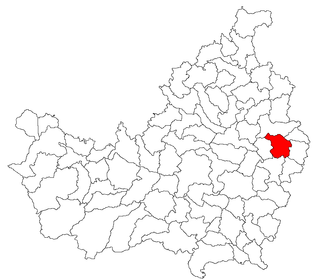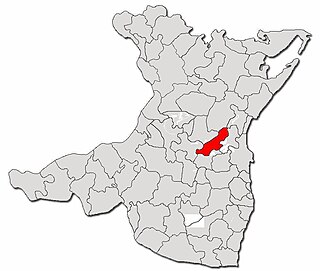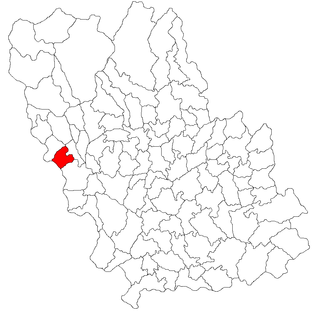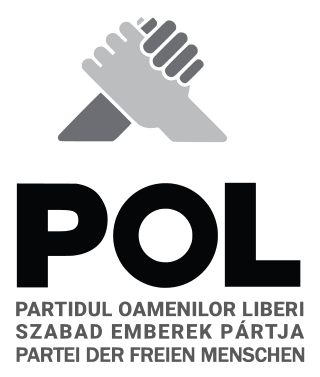
Romania's political framework is a semi-presidential representative democratic republic where the Prime Minister is the head of government while the President, according to the constitution, has a more symbolic role, is responsible for the foreign policy, signs certain decrees, approves laws promulgated by the parliament, and nominates the head of government. Romania has a democratic, multi-party system, with legislative power vested in the government and the two chambers of the Parliament, more specifically the Chamber of Deputies and the Senate. The judiciary is independent of the executive and the legislature. From 1948 until 1989, the communist rule political structure took place in the framework of a one-party socialist republic governed by the Romanian Communist Party (PCR) as its only legal party.

The Social Democratic Party is the largest social democratic political party in Romania and also the largest overall political party in the country, aside from European Parliament level, where it is the second largest by total number of political representatives, after the National Liberal Party (PNL). It was founded by Ion Iliescu, Romania's first democratically elected president at the 1990 Romanian general election. It is currently part of the National Coalition for Romania (CNR), which is a big tent grand coalition comprising also the National Liberal Party (PNL). The CNR formerly included the Democratic Alliance of Hungarians in Romania (UDMR/RMDSZ) until mid June 2023.
An absentee ballot is a vote cast by someone who is unable or unwilling to attend the official polling station to which the voter is normally allocated. Methods include voting at a different location, postal voting, proxy voting and online voting. Increasing the ease of access to absentee ballots is seen by many as one way to improve voter turnout through convenience voting, though some countries require that a valid reason, such as infirmity or travel, be given before a voter can participate in an absentee ballot. Early voting overlaps with absentee voting. Early voting includes votes cast before the official election day(s), by mail, online or in-person at voting centers which are open for the purpose. Some places call early in-person voting a form of "absentee" voting, since voters are absent from the polling place on election day.

Romania elects on a national level a head of state – the president – and a legislature. The president is elected for a five-year term by the people. The Romanian Parliament has two chambers. The Chamber of Deputies has currently 330 members, elected for a four-year term by party-list proportional representation on closed lists. The Senate has currently 136 members, elected for a four-year term by party-list proportional representation on closed lists.

Geaca is a commune in Cluj County, Transylvania, Romania. It is composed of six villages: Chiriș (Kőristanya), Geaca, Lacu (Feketelak), Legii (Légen), Puini (Kispulyon) and Sucutard (Vasasszentgothárd).

Poarta Albă is a commune in Constanța County, Northern Dobruja, Romania. The commune is a port on the Danube–Black Sea Canal.

Presidential elections were held in Romania in 2009. They were the sixth presidential elections held in post-1989 Romania. The first round took place on 22 November, with a run-off round between the top two candidates Traian Băsescu and Mircea Geoană on 6 December 2009. Although most exit polls suggested a victory for Geoană in the runoff, the authorities declared Băsescu the narrow winner with 50.33% of the votes. To date, it is the closest presidential election in the political history of Romania.

A referendum on changing the parliamentary electoral system to a two-round system was held in Romania on 25 November 2007, on the same date as the European elections. The referendum was called by President Traian Băsescu on 23 October 2007 when the Parliament of Romania failed to meet a deadline set by him to pass these changes.

Liberal Party is a conservative-liberal political party in Moldova. The president of the party is the former Mayor of Chișinău, Dorin Chirtoacă.

Local elections were held in Romania on 1 June 2008, with a runoff for mayors on 15 June 2008.

Horia is a commune in Tulcea County, Northern Dobruja, Romania. It is composed of three villages: Cloșca, Florești and Horia.

Provița de Jos is a commune in Prahova County, Muntenia, Romania. It is composed of three villages: Drăgăneasa, Piatra, and Provița de Jos.

Protests against the April 2009 Moldovan parliamentary election results began on 6 April 2009 in major cities of Moldova before the final official results were announced. The demonstrators claimed that the elections, which saw the governing Party of Communists of the Republic of Moldova (PCRM) win a majority of seats, were fraudulent, and alternatively demanded a recount, a new election, or resignation of the government. Similar demonstrations took place in other major Moldovan cities, including the country's second largest, Bălți, where over 7,000 people protested.

The Party of Socialists of the Republic of Moldova is a democratic socialist political party in Moldova. A populist party, it holds Eurosceptic and Russophilic views, both of which are reflected by its long-time former leader Igor Dodon. It is contrasted to like-minded centre-left European parties for its conservative views on social issues, reflecting the country's strong social conservatism and the influence of the Moldovan Orthodox Church.

Ace Combat: Joint Assault is a 2010 combat flight simulation video game developed by Access Games and published by Namco Bandai Games for the PlayStation Portable. It is the second in the Ace Combat franchise to be released for the PlayStation Portable and the fourth for a portable platform. It is also the first game in the franchise to be set in the real world. The game was released in 2010 in Japan on 26 August, in North America on 31 August, and in Europe on 24 September.

Parliamentary elections were held in Romania on 11 December 2016. They were the first held under a new electoral system adopted in 2015, which saw a return to the proportional electoral system last used in the 2004 elections. The new electoral legislation provides a norm of representation for deputies of 73,000 inhabitants and 168,000 inhabitants for senators, which decreased the number of MPs.

Presidential elections were held in Romania on 10 November 2019, with a second round held on 24 November 2019. They were the eighth presidential elections held in post-1989 Romania. Incumbent President of Romania Klaus Iohannis, first elected in 2014, was eligible for re-election. He subsequently defeated former Prime Minister and ex-leader of the Social Democratic Party (PSD) Viorica Dăncilă in the second round of the election by a landslide, receiving 66 percent of the vote – the second-highest vote share on record in this type of elections after Ion Iliescu.

In Romania, the standard time is Eastern European Time. Daylight saving time, which moves one hour ahead to UTC+03:00 is observed from the last Sunday in March to the last Sunday in October.

Freemen's Party is a regionalist and localist political party in Romania. The party was founded in October 2015 by Dan Mașca, Cătălin Hegheș, Radu Bălaș and Eugen Tothpal.
















